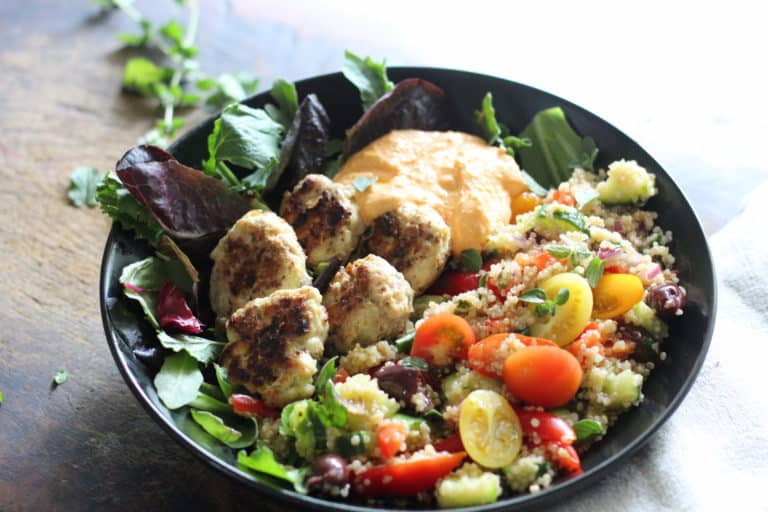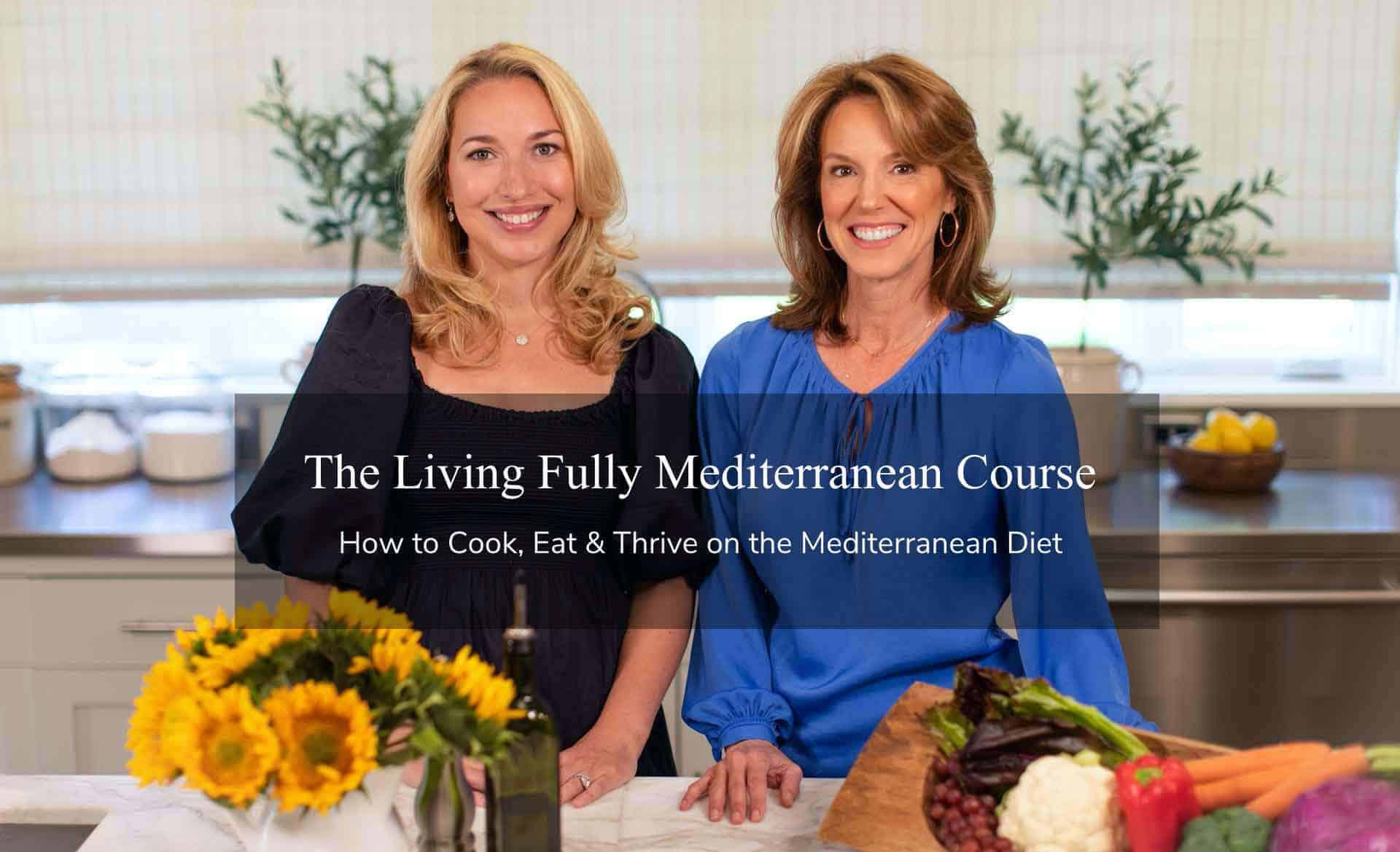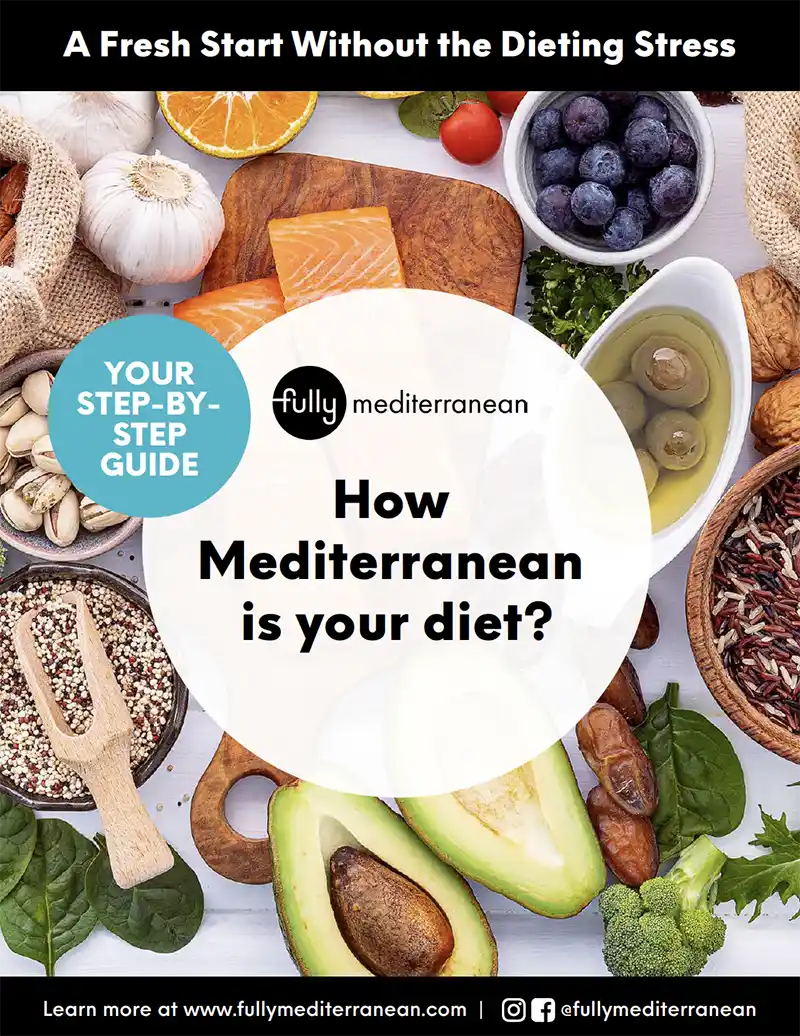Learn the ins and outs of how to start the Mediterranean diet and why it’s considered one of the healthiest diets in the world.
The Mediterranean diet has been rated the top diet by the US News and World Report for the past five years, and with good reason! It’s a sustainable and holistic way of eating that incorporates healthy food, quality time with friends & family, regular movement, and mindful living.
This eating pattern puts food first with an emphasis on real and whole foods including fruits, vegetables, whole grains, lean proteins, and healthy fat. These nourish your body and mind. Plus, you still get to enjoy a glass of wine! Say no more!
Here, we teach you the health benefits of the Mediterranean diet, how to start the Mediterranean diet, and the types of foods to include and avoid.
What Is The Mediterranean Diet?
The Mediterranean diet is a pattern of eating that reflects the food and recipes of countries bordering the Mediterranean Sea. Studies on the Mediterranean diet began over 60 years ago. Researchers noticed that deaths related to cardiovascular disease were lower in countries that border the Mediterranean sea than they were in the United States and Northern Europe.
Eating styles and cuisines in these countries may vary, but the principles remain the same.
The Mediterranean Diet emphasizes:
- vegetables
- fruits
- whole grains
- beans
- legumes
- moderate amounts of low-fat or fat-free dairy products
- fish
- poultry
- nuts
- seeds
- olive oil
The Link Between The Mediterranean Diet And Lower Risk Of Disease
This style of eating has been shown to play a large role in preventing chronic diseases like:
- Heart disease and stroke
- Type 2 diabetes
- Cancer
- Alzheimer’s
- Parkinson’s
- Dementia
It also helps to reduce risk factors such as obesity, diabetes, high cholesterol, and high blood pressure.
What Can You Eat On The Mediterranean Diet?
In order to reap all of the benefits of the diet, you have to incorporate all the components. The impressive health benefits come from the eating pattern as a whole, not from the individual food. Sorry to disappoint you, but you can’t just add the red wine.
Vegetables and Fruit
The Mediterranean diet is the original plant-based diet. Ample fruits and veggies should be included with most meals and snacks. They are packed with vitamins, minerals, fiber, and antioxidants that help reduce inflammation and promote immunity.
Legumes
Legumes (beans, lentils, peas) are a terrific source of protein and fiber. They are a budget-friendly option and are high in B vitamins, zinc, iron, calcium, potassium, folate, and phosphorus.
Whole Grains
Whole grains (couscous, brown rice, quinoa, farro, oats, whole wheat pasta, etc.) are packed with fiber, B vitamins, iron, copper, zinc, and magnesium.
Heart Healthy Fats
Heart health fats (extra virgin olive oil, avocados, nuts, and seeds) provide omega- 3 fatty acids and antioxidants. Omega- 3 fatty acids can help reduce inflammation and improve cholesterol levels.
Fish, Seafood, and Lean Protein
Protein is the building block of life and plays many key functions in the body, like cell repair and muscle growth. The Mediterranean diet puts emphasis on choosing fatty fish like salmon, mackerel, tuna, and herring. These fish contain high doses of inflammation-fighting omega-3 fatty acids. It also includes other lean protein sources like chicken and turkey.
Low-Fat Dairy
Low-fat dairy (feta, yogurt, kefir, cottage cheese, ricotta) can be enjoyed in moderate amounts and are an excellent source of protein, vitamin D, calcium, and phosphorus.
Recipe Idea
This Greek meatball recipe is a great example of how to incorporate most of these food dishes in a meal!

Greek Meatballs with Mediterranean Quinoa
What Foods Are Not Allowed On The Mediterranean Diet?
The good news is that all foods are included on the Mediterranean diet. The Mediterranean Diet limits:
- Added sugars
- Sugar-sweetened beverages
- Salt
- Highly processed foods
- Refined carbohydrates
- Saturated fats
- Fatty meats
Studies show that diets high in these foods can lead to chronic inflammation, a risk factor in many diseases.
The Mediterranean Diet Pattern is a way of eating that is meant to be flexible, inclusive, and not restrictive. These foods can still be incorporated as a part of a balanced diet- just in small amounts. Restrictive diets, like many popular or fad diets, often over-emphasize eating certain types of foods. This can put you at risk of not getting all of the essential nutrients your body needs.
What Is The Easiest Way To Start The Mediterranean Diet?
How to start the Mediterranean diet you might ask? It might seem intimidating to get started, but the Mediterranean diet is for everyone. With a few simple swaps and additions, you will be on your way to a more balanced and nourishing way of eating.
- Add more fruits and veggies to your meals and snacks
- Swap red meat with fish
- Swap butter with olive oil
- Swap refined grains with whole grains and legumes
- Swap sugar-sweetened beverages with water
- Enjoy a “meatless” meal at least once a week
- Engage in regular physical activity
- Enjoy meals with friends and family
Want to learn more? Download our Step-by-Step Guide to starting the Mediterranean Diet.
How Do I Transition To The Mediterranean Diet?
Transitioning to the Mediterranean diet doesn’t have to be difficult or a complete “overhaul.” It can be done slowly over time. We recommend making small consistent changes.
- Try adding some spinach to your morning eggs
- Enjoy an apple with peanut butter for a snack instead of chips
- Order the salmon vs. the steak next time you go out to eat
- Try sautéing your veggies in a little olive oil instead of butter
All of these small changes truly add up over time and can have big health benefits!
How Quickly Does The Mediterranean Diet Work?
The Mediterranean diet is not a quick-fix-diet- it’s a lifestyle. As with any health/ lifestyle change, the time it takes to see results varies from person to person. With consistency, many people notice improvements in their energy, sleep, and even weight in just 2-3 weeks.
Because this lifestyle emphasizes balance and is not restrictive, long-term adherence to the Mediterranean diet has even been associated with a decreased risk of gaining weight and belly fat over five years.
Will The Mediterranean Diet Work For Me?
Oftentimes people feel there is a missing link with other resources out there – whether that is not knowing which recipes to follow, not having the tools to meal plan properly, or not having the support you need to stay on track. We provide all of those things and more in our Living Fully Mediterranean Course.

It’s never too late to get started. The Mediterranean diet is versatile, nutritious, and easy to follow. Start by choosing one component and slowly add on. Looking for more help with this? Check out our Step-by-Step Guide to Starting the Mediterranean Diet for How to start the Mediterranean diet.

0 Comments